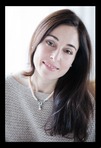Four years ago when I decided I wanted to become a novelist I knew very little about how to construct and organize a story. I began reading "how to" books and books on writing to learn the craft which helped me a lot. Today after publishing my first novel entitled "Running for Yellow", I'd like to say that beginning work on my second novel will be easier. It will and it won't. Although I know much more about writing than I did four years ago, I have so much more to learn and this paralyzes me with fear at times. I worry it won't be better than my first one. I worry I won't complete it let alone reach my goal of writing ten novels in the coming years. I feel a strong empathy for aspiring writers when they tell me they would love to write a novel but could never do it. When I hear this I always offer support, but sometimes, deep down, I feel the same way about writing a second novel as they do about their first.
One night after watching the awesome movie "Julie & Julia" with my boyfriend, I shared with him my fears about sitting down at my writing desk and beginning the process again. He looked at me with the sweetest expression and quoted a line form the movie. He said: "Julia wasn't always Julia." He then reminded me that Julia Child couldn't boil an egg when she first started cooking. He suggested I start a blog to get me writing again. After thinking about it for some time, I thought aspiring writers might like to read reviews about "how to" books and books on writing by an author who has used them to learn how to write fiction. In the process I could actively continue to learn about the craft as well and perhaps find inspiration for my next novel. I decided I would read and review a book on writing every month and share my insights on what I think writers might find helpful.
The great Pablo Picasso once said: "Inspiration does exist, but it must find you working." I believe this explicitly. I hope my blog will help you and me write our next great novel. Let's get started together. Here we go...!
The first book I'll review is ""YOU CAN WRITE A NOVEL" by James V. Smith, Jr. I referred to it often when I wrote RFY. I think it's an awesome book for a first time author to read and study. I took notes on index cards on points I thought were super poignant to my writing goals and read them often so I would remember them. James Smith breaks down the process into simple, logical steps. He starts with tips on finding and refining a salable idea for your novel. Once you've done this, he has you build an indispensable Writer's Tool Kit which helps you organize your thoughts and characters onto paper. This kit includes index cards with pertinent information about characters and scenes. Throughout the book Smith includes numbered Lifesaving Rules for the Writer which are a variety of short technique advisories designed to keep you from wasting time or making fatal errors. My favorites are his Cardinal Rules that every writer should keep in mind while working on a draft. I copied these on index cards too and read them often. For me, the most indispensable part of the book is how Smith teaches an organized method to construct the framework for the story pieces. Smith offers fifteen steps for building a road map that will guide you from your novel's opening to its end. And believe me, I used it and it works. He teaches that every story should have nine master scenes. He explains (and includes figures of) the master story model where you write out nine master scenes on separate 5x8 index cards. Then on 3x5 index cards, you fill in the minor scenes that lead up to each master scene. He also explains how to increase the pace of the novel by bunching master scenes closer together as the story unfolds to keep the story exciting and the reader turning pages. By plugging in minor scene after minor scene into each master scene, you are developing an organized and complete framework for the story.
If you're looking for one book that will teach you how to get the bones of your story on paper in an organized fashion, "You Can Write A Novel" is the book for you.
I hope you've found this information helpful. I want to hear from you so please feel free to post comments. Next month I'll review "How to Write" by Herbert E. Meyer and Jill M. Meyer.

Published on April 21, 2014 10:03
 newest »
newest »
 newest »
newest »
 This is great stuff. I'm in! I love the Picasso quote too. And remember: "Pablo wasn't always Pablo"!
This is great stuff. I'm in! I love the Picasso quote too. And remember: "Pablo wasn't always Pablo"!





